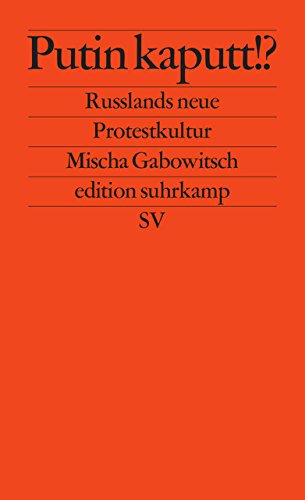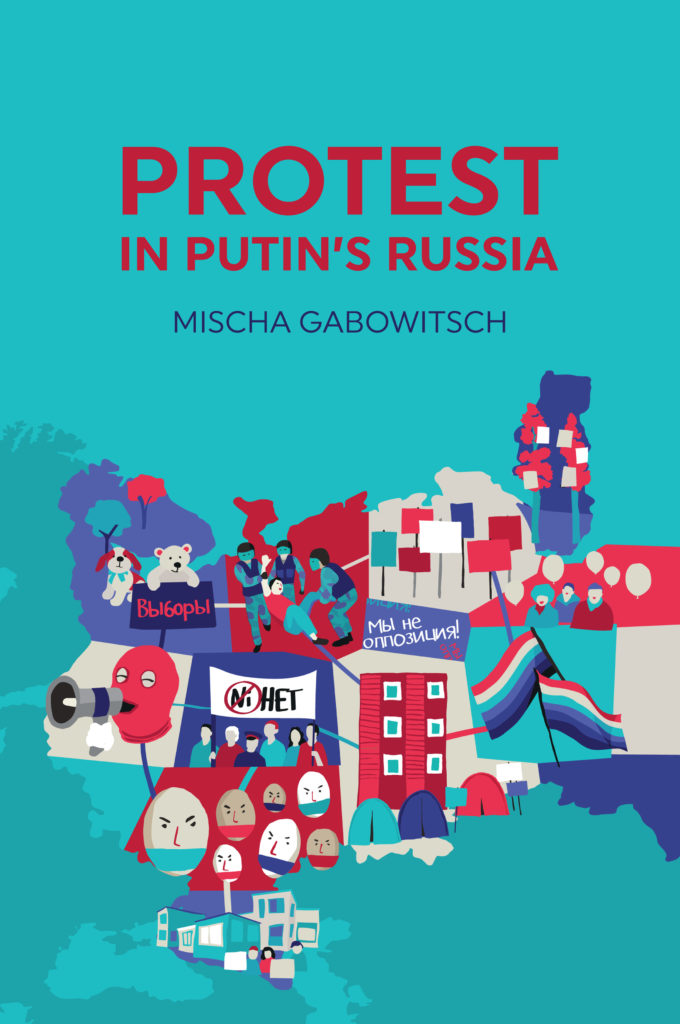I have been studying protest, activism, and social movements in the late USSR and post-Soviet Russia since the mid-1990s. At the time I was primarily interested in nationalist and anti-nationalist (in particular, antifascist) associations of various kinds. With the beginning of the new protest cycle in late 2011, I drew on my observations in this area to study other forms of mobilization. The result was the first book-length scholarly study, in any language, of the 2011-13 Russian protests. The book came out in German in 2013 and later in a thoroughly revised and expanded, in fact largely re-written English version. One basis for that book, in addition to interviews and fieldwork, was the PEPS database, a comprehensive collection of photos, descriptions, and slogans from protest events in every Russian region and beyond Russia’s borders. As a sociologist I am less interested in the strategic dimension of protest or its role as a black-box indicator of underlying social factors than in its internal dynamics and the different regimes of engagement governing protest participation. I am also interested in the history and theory of non-violence and the role of social media in protest. Another area of interest are structural similarities between protest and commemorative movements.
In 2020 I also began studying protest in Belarus, a country I have visited regularly in recent years for archival research in different regions connected to my work on the history of Soviet war memorials. My colleague Nelly Bekus and I have put together a Slavic Review forum and a special thematic issue of Communist and Post-Communist Studies on the Belarusian protests. I was also working on the dynamics between state populism and social protest in Russia in comparison with other BRICS countries as part of a collaborative project funded by the South African National Institute for the Humanities and the Social Sciences, though the full-scale Russian invasion of Ukraine in February 2022 put my work on that topic on hold.
Below you will find my publications and talks on post-Soviet protest in English, Russian, German, French, and Portuguese as well as interviews with me on these topics (in English, Russian, German, French, Spanish, Greek, and Catalan).
Books


Accolades:
“This is the best book about contemporary Russia that I have ever read. It is stereotype-free, subtle, and superbly written.”Karine Clément, director of the Collective Action Institute (IKD), author/editor of
Russian Workers in the Upheaval of the Market Economy, 1989-1999 (in French),
Ordinary People into Activists (in Russian), and
Urban Movements in Russia, 2009-2012 (in Russian)
“One of the best books about Russian society I have read in recent years”Jens Siegert, former director of the Moscow office of the Heinrich Böll Foundation
“Protest in Putin’s Russia combines stirring reportage with conceptual sophistication, taking readers into sites of protest not only in Moscow but in cities across Russia.”Benjamin Nathans, Alan Charles Kors Endowed Term Associate Professor of History at the University of Pennsylvania, in the New York Review of Books
“Enthralling”The editors of the European Journal of Cultural and Political Sociology
Frequently asked questions
Is the English edition simply a translation of the German book?For technical reasons Protest in Putin’s Russia was formally published as a translation from the German, but in fact I spent more time on revising and expanding that version than I had on writing the German book. The chapters that made it into the English edition were substantially reworked, expanded and updated, and I also made the theoretical premises of the study much more explicit in the new introduction. However, due to space restrictions I had to leave out two chapters from the English translations. Thus if you know both English and German I recommend reading the English version of the book plus the chapters about non-violence and the repressive apparatus from the German edition.
However, I may have overestimated some readers’ attention to detail and the extent to which the title’s implications are intuitive. While reactions to the book were overwhelmingly positive, some judged the book not simply by its cover but by a selective reading of the words on that cover. In the English version, to avoid such misunderstandings, I opted for a more neutral title.
Articles
- Protest and Authoritarian Reaction in Belarus: New Subjectivities and Beyond (co-edited with Nelly Bekus). Communist and Post-Communist Studies. September 2023. Vol. 56. No. 3. P. 1-126.
- Introduction to the Special Issue on Protest and Authoritarian Reaction in Belarus: New Subjectivities and Beyond (with Nelly Bekus). Communist and Post-Communist Studies. 2023. Vol. 56. No. 3. September. P. 1-21.
- Critical Discussion Forum: The Sociology of Protest in Belarus—Social Dynamics, Ideological Shifts, and Demand for Change (co-edited with Nelly Bekus). Slavic Review. 2021. Vol. 80. No. 1. P. 1-68.
- Introduction: The Sociology of Belarusian Protest (with Nelly Bekus). Slavic Review. 2021. Vol. 80. No. 1. P. 1-3.
- Belarusian Protest: Regimes of Engagement and Coordination. Slavic Review. 2021. Vol. 80. No. 1. P. 27-37.
- Working Paper: Fine-Tuning Protest Event Analysis: Collecting Participant-Generated Event Data and Protest Slogans in an Internet Age. The PEPS database (with Olga Sveshnikova), forthcoming on www.discuss-data.net.
- COVID-19 in Russia: Mishandling Has Led to Popular Protests but Putin Remains Strong. The Wire (India). 25 July 2020
- republished in The Daily Maverick (South Africa)
- em português (Outras Palavras, Brasil): BRICS: covid escancara os abismos regionais da Rússia
- Regimes of Engagement and Protest in Russia: A Reply to Arnold, Sidorkina, and Shevchenko. Nationalities Papers. Vol. 48. No. 2 (March) 2020. P. 414-418.
- [book review] Olena Nikolayenko. Youth Movements and Elections in Eastern Europe. Cambridge: Cambridge University Press, 2017. Slavic Review, Winter 2018. P. 1097-1098.
- Opposition und Protest in Russland. In: Bundeszentrale für politische Bildung, Dossier Russland, 9.5.2018.
- Are Copycats Subversive? Strategy-31, the Russian Runs, the Immortal Regiment, and the Transformative Potential of Non-Hierarchical Movements. In: Problems of Post-Communism. 2018. Vol. 65. No. 5, p. 297-314. Published online: 29.11.2016.
- abridged version in: Birgit Beumers, Alexander Etkind, Olga Gurova, Sanna Turoma (eds.), The Shrew Untamed: Cultural Forms of Political Protest in Russia. London: Routledge, 2017, 68-89.
- Putin’s regimes. openDemocracy, 10.12.2016
- Sozialprotest. Enzyklopädieeintrag, dekoder.org, 26.7.2016
- Protestbewegung 2011-2013. Enzyklopädieeintrag, dekoder.org, 30.3.2016
- Extremismuszentren. Enzyklopädieeintrag, dekoder.org, 9.12.2015
- Piket. Enzyklopädieeintrag, dekoder.org, 8.12.2015
- Bolotnaja-Bewegung. Enzyklopädieeintrag, dekoder.org, 16.11.2015
- Both your houses. Protest and opposition in Russia and Ukraine. Eurozine, 22.1.2014
- En Russie, les manifestations de curiosité. Le Huffington Post, 11.11.2013
- Gewaltfreier Widerstand. Vergleichende Betrachtungen zu Dynamik und Erfolgsbedingungen. Mittelweg 36 August/September 2012, S. 61-67.
- Gewalt und Gewaltfreiheit in der Bewegung für faire Wahlen in Russland. Mittelweg 36, August/September 2012, S. 68-74.
- Social media, mobilisation and protest slogans in Moscow and beyond. Digital Icons: Studies in Russian, Eurasian and Central European New Media 7 (2012), p. 213-225.
- A Strategy for Russia’s Snow Revolution. Project Syndicate. 5.2.2012. (title chosen by the editors)
- republished in e.g. The Japan Times, Die Welt, The Korea Herald, Daily News Egypt, The Daily Star (Lebanon), The Moscow Times, Times of Pakistan, Gazeta Wyborcza
- Russia. In: Bogdan Szajkowski (Ed.), Revolutionary and Dissident Movements of the World, 4th edition, London: John Harper Publishing, 2004, pp. 414-424.
Interviews
- „Die Proteste haben ein klares Ablaufdatum“. Wiener Zeitung, 9.8.2019
- „Eine klare Botschaft, dass die Leute stillhalten sollen”. Die Zeit, 6.8.2019
- „Man protestiert nicht nur, um strategisch ein Ziel zu erreichen“. dekoder.org, 10.9.2019.
- неавторизованный русский перевод: «Люди протестуют не только ради достижения стратегических целей»
- unverified English translation: “Protesting is not Just About Reaching a Strategic Goal”
- Moskauer Protest – neue Bolotnaja-Bewegung? dekoder, 1.8.2019
- „Viele wenden sich schnell wieder von den Protesten ab”. Nürnberger Nachrichten / Nordbayern.de, 3.1.2017.
- „Russland ist kein exotischer und mysteriöser Einzelfall“. Karandashy.org, 10.11.2015.
- „Wladimir Putin hatte berechtigte Angst“. Die Presse, 15.11.2014.
- „Es wird immer schwieriger, zu protestieren“. Zeitschrift für Kulturaustausch III/2015.
- “El ‘sistema Putin’ es basa en les xarxes clientelistes de l’Estat”. Directa (Barcelona). 11.12.2013. P. 13.
- “Es erróneo presentar la política rusa como una batalla entre el Kremlin y la oposición”. Sin Permiso. 29.12.2013.
- Συνέντευξη με τον Mischa Gabowitsch. x-pressed, December 2013.
- «Не надо стремиться к созданию “общеевропейской памяти”». Новая Эўропа, 20.10.2013. (О протесте — ближе к концу интервью.)
- О «феномене Навального» глазами социолога. День (Киев), 25.7.2013.
- „Neue Vernetzung der Proteste“. Der Standard, 13.7.2013.
- Russlands junge Protestkultur. Ostpol, 16.5.2013.
- Berliner Colloquium “Nonviolent Resistance in History, Theory, and Practice.” Interview zu Konzept und Durchführung. Februar 2012
Video / audio
Proteste gegen Putin: Russlands neue Bürgerbewegung. SRF, 21.5.2013